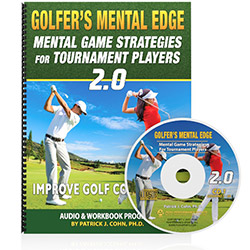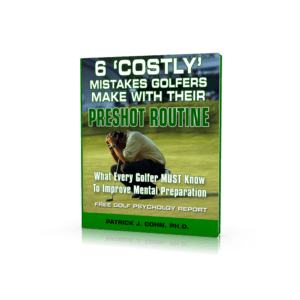Do You “Play-It-Safe” or “Go For It”?
Are you afraid to “go for it” during a round of golf for fear you will miss shots when they matter most?
Do you lack the confidence to take risks and instead opt to play it safe when you golf?
Most golfers believe you need to be confident to take risks. While that is partially true, confidence and risk taking have a much deeper relationship.
Golfers who play it safe may have lower confidence, but the main reason for not taking risks is the fear of a bad result.
The safe shot only seeks to avoid major trouble, such as bogeys or the dreaded double-bogey.
So instead of going for birdie, “play-it-safe” golfers shoot for par and shoot the same score over and over and over.
This doesn’t mean you should play with reckless abandon… But when the time comes to go for it, it is necessary to take the risk in order to lower your score.
In order for a shot to be considered a risk, it must involve some challenge.
When you challenge yourself and let go of the potential rewards, you begin to grow your confidence.
Remember that in order to take a risk, you must have some degree of belief that you have a good chance to hit a successful shot (play within your abilities).
It is sort of like a ropes course… You overcome fear by taking risks which fosters confidence. Soon you will learn that you can play well in circumstances you once feared. This type of risk taking builds confidence by taking you out of your comfort zone.
As you start hitting those shots you were afraid to take, your confidence grows even more… But it started with overcoming that confidence-wrecker named fear.
Graeme McDowell was tired of playing average golf when he decided to take some more risks in 2016.
In 2015, McDowell had one of his worst years as a professional making only 8 cuts in fifteen events on the PGA Tour.
McDowell admitted that par was often his end goal for tournaments which hurt both his confidence and performance on the golf course.
Once McDowell decided to “go for it,” he saw drastic improvement.
In 2016, McDowell has five Top 10 finishes including a victory at the OHL Classic and is ranked 35 in the FedEx standings.
McDowell’s newfound “taking risks” mentality paid dividends at the Wyndham Championship, where McDowell shot -14 to finish tied for fifth.
After shooting a 64 in the third round, McDowell talked about how confidence, risk taking and focusing in the present have helped his game.
McDOWELL: “It does a lot for your confidence when you’re making eight birdies today. That’s what you want to do. It makes you feel good. It makes you stop worrying about the bad stuff and start seeing the good stuff again.”
Tips for adopting a “go for it” mentality:
First, you must know the risk and reward of every shot. Firing at a pin in the middle of the green has little risk. However, trying to carry the trees on a dogleg has greater risk.
Next, let go of the fear of poor results. Most golfers who play tentatively focus on avoiding mistakes. This happens a lot when golfers are playing “better than expected” and hit the breaks.
Lastly, start taking 1-2 smart risks per round. Visualize and see the shot you want to hit. Narrow your focus on the target, letting go of the trouble.
Discover some of my mental game strategies for golf here!
Learn Proven Strategies to Perform with Confidence!
Do you suffer from fragile self-confidence after missed hits, playing with strict or high expectations that undermine confidence or the inability to play freely and relaxed on the course?
If you suffer from lack of focus, low self-confidence or other mental game obstacles on the course, you cant reach your true golf potential…
What are students saying?
“To play well, you have to believe you can play well. Confidence goes a long way in golf. Patrick has developed a great system for helping me improve confidence and my overall mental approach to golf.”
~Brian Watts, 11-time Winner on the PGA Japan Tour
“Dr. Cohn has helped me improve confidence and build a consistence pre-shot routine that helps me stay confident, and learn how to play one shot at a time during competition. He also taught me that I don’t have to hit every shot perfect to score well.”
~Brian Belden, Winner 2003 AJGA Steel City Junior Classic & Marsh Junior at Hawk Pointe
 Learn Powerful Golf Confidence Strategies!
Learn Powerful Golf Confidence Strategies!
What are customers saying?
“The amount of knowledge I’ve learned from your eBooks, books, and podcasts at Peaksports is fantastic! You’re the best Mental Training coach I’ve found.”
~Gavin Clark, PGA Member
Boost Your Self-Confidence And Focus With Expert Mental Game Coaching!
Master mental game coach Dr. Patrick Cohn can help you overcome your mental game issues with personal coaching.
You can work with Dr. Patrick Cohn himself in Orlando, Florida or via Skype, FaceTime, or telephone. Call us toll free at 888-742-7225 or contact us for more information about the different coaching programs we offer!
What are our students saying?
“You helped me with my routine—it’s almost like it has a flow to it—you pull your club and boom you are into it. You should glide through the routine. It’s when you try to make yourself stick to a cadence; the routine feels out of sync. Helping me get into the flow of the routine has been a big help.”
~Joe Durant, PGA Tour winner



 Learn Powerful Golf Confidence Strategies!
Learn Powerful Golf Confidence Strategies!